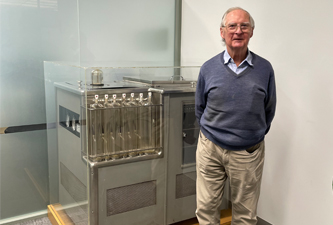Posted 18 January 2022

Essential for life, proteins are needed every day in every part of us: to make new cells and build muscle, to send messages and to support the immune system. Our bodies produce as many as 500,000 different kinds of these large and complex molecules, each comprised of a chain (or sequence) of amino acids folded into a complex threedimensional shape.
Prior to his arrival in Australia, Edman had famously worked out how to sequence proteins, but the process was cripplingly slow, difficult and repetitive: sequencing even a small protein could take several years.
Encouraged by Edman, Geoff Begg used his initiative and skills (which included glassblowing) to help build a machine that could speed up and automate the sequencing. Affectionately nicknamed ‘Matilda’ – and later formally dubbed ‘The Sequenator’ – the world’s first automated sequencer took a year to build, and a further six years to perfect.
Geoff had the opportunity to visit SVI between lockdowns last year, and met with Professor Tom Kay, and former Director, Professor Jack Martin, and toured Associate Professor Jon Oakhill’s laboratory to see how research today still draws on discoveries made possible by the Sequenator.
“Having been involved with the Institute from its very beginnings, I was very proud to see just how much it has developed and advanced over the years. It was wonderful to be able to observe the important work that is being done in the laboratories today,” says Geoff.
The work done by Edman and Begg had a huge impact, with the automated sequencing of proteins playing a central role in improving diagnosis and treatment of disease right around the globe – until it was superseded by other technology in the 1990s.
“At my age it’s easy to feel obsolete,” Geoff comments. “But I was impressed that the Institute staff are still very genuinely interested in hearing about the work we did so many years ago on the Sequenator, and that this early work laid so many foundations for the Institute’s future success.”
Image: Geoff Begg stands in front of the Sequenator during his visit to SVI in 2021